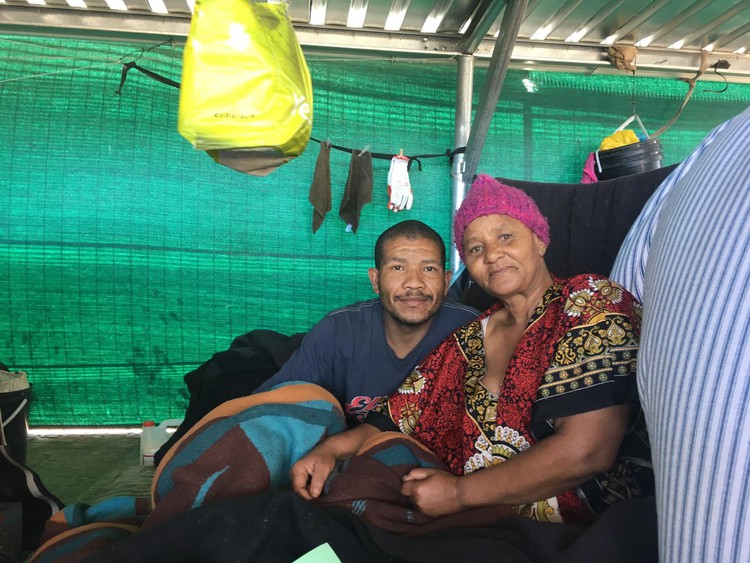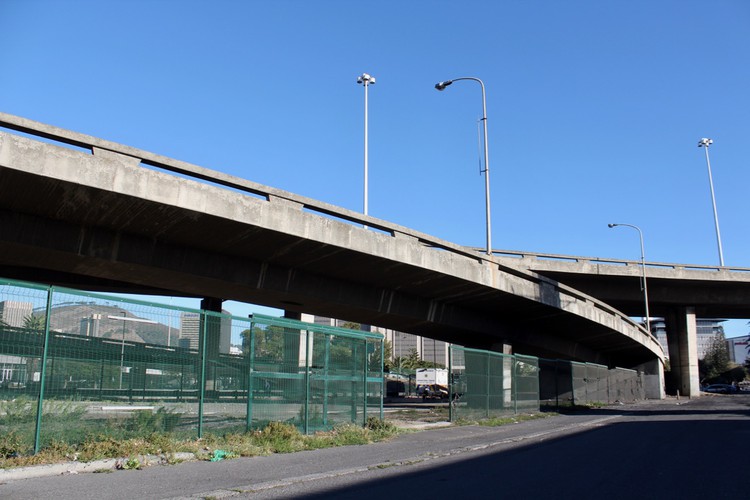Safe Space helping to reintegrate Cape Town’s homeless
“They can help you, but it’s entirely up to you if you want to change your life”
The Safe Space under Culemborg bridge in Cape Town’s city centre has helped secure part-time employment for 48 homeless people and reunited eight people with their families since it was opened in July, according to the City.
Nathaniel and Sophia Booysen have been at the facility since 22 July. Sophia was on the streets for two years and Nathaniel for 11 years in Oakdale. They were approached by representatives from the City’s Department of Social Development about staying at the Safe Space. “We’re happy here,” said Sophia.
During the day, they go to The Haven Night Shelter to get food.
She is hoping to secure temporary work as a fieldworker through the Expanded Public Works Programme (EPWP). “I’ll be working at 2am every morning so we can find out where homeless people sleep at night. I’ll be making R1,200 every second week.”
Alderman JP Smith, Mayoral Committee Member for Social Services, said 200 EPWP opportunities will be available over the festive season.
Bonita Gamba has been at the Safe Space for three weeks. Gamba works two-hour shifts daily at the Jesus Saves programme and makes R50. Before arriving at the Safe Space, she said she spent over half of her disability grant to stay at a shelter in the city.
“I was treated like a second-class citizen when I went to other shelters. The food was minimal and the living conditions were terrible. The supervisors were insensitive and not compassionate. Here you do your own thing. Nobody is shouting orders at you or telling you how to behave,” said Gamba.
Siraaj Isaacs is a drug user who has been staying at the Safe Space for two weeks. Social workers on the site have assisted him with going into rehabilitation at The Salvation Army in Klapmuts in January 2019. In the meantime, the social workers are helping him find a temporary job through the EPWP. He said he would like to be able to buy his daughter a Christmas gift.
“They can help you, but it’s entirely up to you if you want to change your life. I’m still young. It’s not over for me,” said Isaacs.
Isaacs said the coverage provided by the shelter could be better. “When it rains, there is no protection … At night while you’re sleeping, the wind blows the blankets off you. It gets so cold … I don’t want to be ungrateful but the city could’ve done a better job in fixing up this place.”
The City is clear that the Safe Space is intended as a transition for those willing to get off the street. “We’ve tried to make it as liveable as possible … It is not somewhere where you want to be forever,” said Smith. “The arrangement with everybody is that they will understand that they need to move on at some point to the next option.” He said the City hopes to establish six other Safe Spaces in the future.
The overnight sleeping facility provides 230 beds, of which 210 are currently filled. It was an initiative of the City’s Social Development and Early Childhood Development Department to address the shortage of beds at shelters in the city centre and the safety of those sleeping on the streets.
The space is protected by 24-hour law enforcement officers. It supplies beds, lockers, toilets, showers and coffee. Food is not provided. The residents must leave the space at 8:30am and return at 5pm.
According to Smith, about 20 people have been either relocated to their hometown, reunited with their families, placed in senior care facilities, or in alternative shelters closer to their family and work opportunities.
Social workers have helped 48 people get part-time employment at partnered organisations such as Jesus Saves and Straatwerk. They have also helped five people secure permanent employment.
Smith said about 50 people have left the Safe Space because of dissatisfaction with the rules, such as its no-drug policy and requirement that people “commit to some form of personal development geared towards reintegration”.
The Safe Space is located under Culemborg bridge in the Cape Town city centre. It was opened in July 2018 and has 230 beds. Photo: Aidan Jones
Support independent journalism
Donate using Payfast

Don't miss out on the latest news
We respect your privacy, and promise we won't spam you.
Next: Court spells out to SANDF how it must accommodate Marievale residents
Previous: Khayelitsha child care principals ask for fee increase
© 2018 GroundUp.
This article is licensed under a Creative Commons Attribution-NoDerivatives 4.0 International License.
You may republish this article, so long as you credit the authors and GroundUp, and do not change the text. Please include a link back to the original article.


